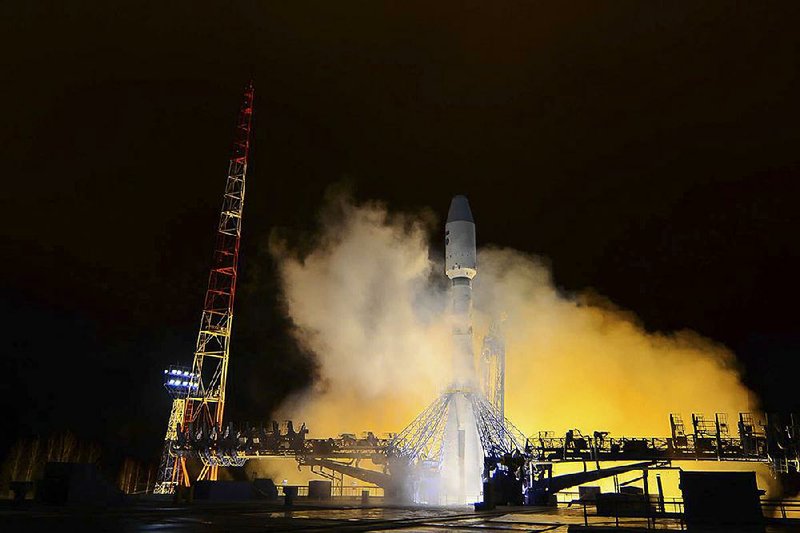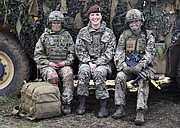Soyuz launch is first since liftoff failure
MOSCOW -- A Russian Soyuz rocket put a military satellite in orbit Thursday, its first successful launch since a similar rocket failed earlier this month to deliver a crew to the International Space Station.
The Russian military said a Soyuz-2 booster rocket lifted off from the Plesetsk facility in northwestern Russia.
A Soyuz-FG rocket carrying NASA astronaut Nick Hague and Roscosmos' Alexei Ovchinin failed two minutes into the flight on Oct. 11, sending their emergency capsule into a sharp fall back to Earth. The crew landed safely, but the Russian space agency Roscosmos had suspended all Soyuz launches until Thursday, pending an investigation.
The official panel is yet to produce its formal verdict, but investigators reportedly have linked the failure to an element jettisoning one of the rocket's four side boosters from the main stage that apparently had been damaged during final assembly at the Russia-leased Baikonur cosmodrome in Kazakhstan.
Russian space officials plan to conduct two other unmanned Soyuz launches before sending a crew to the space station. No date for the crew launch has been set yet, but it's expected in early December.
The current space station crew -- NASA's Serena Aunon-Chancellor, Russian Sergei Prokopyev and German Alexander Gerst -- was scheduled to return to Earth in December after a six-month mission.
Iraqi premier moves out of Green Zone
BAGHDAD -- Iraq's new prime minister began moving his offices out of Baghdad's highly secure Green Zone on the first day of his term Thursday, saying he wanted to take his government closer to the people.
Adel Abdul-Mahdi held his first news conference in a rehabilitated government compound opposite Baghdad's iconic central railway station, near the city center.
"We want to consider all of Iraq a Green Zone," said Abdul-Mahdi.
The U.S. established the Green Zone in 2003 to secure its embassy and Iraqi government institutions. But the zone has become a symbol of the country's aggressive inequality and fueled the perception among Iraqis that their government is out of touch.
The new location, approximately 2 miles from the Green Zone, used to contain the offices of Parliament under the late dictator Saddam Hussein. Access is tightly controlled by security forces, who guard the main gate with armored vehicles
Abdul-Mahdi begins his tenure facing a raft of challenges including high unemployment, widespread corruption, dilapidated public services and poor security.
Frustration over chronic power cuts and water pollution sparked riots in Iraq's southern provinces in the summer.
Reporter back in Japan, gets rice balls
TOKYO -- A Japanese journalist returned to Tokyo on Thursday after being freed from more than three years of captivity in Syria, and was greeted at the airport with hugs from his wife and his favorite handmade rice balls from his mother.
Jumpei Yasuda was released in Syria on Tuesday and taken to neighboring Turkey.
Yasuda, wearing a black T-shirt, was escorted from his plane at Tokyo's airport by Japanese officials and ushered into a black van. He left without talking to a large group of reporters who had waited for his arrival.
He briefly met his wife and parents and enjoyed his mother's rice balls -- his first meal after returning to Japan.
In a short message released by his wife Myu, Yasuda said he was grateful that he could return home safely and promised to explain his experiences at a later date.
On an earlier flight from the southern Turkish town of Antakya to Istanbul, Yasuda said he was happy to be going home after living in "hell" for more than three years, but was worried about how he would catch up with a changed world.
"I'm so happy to be free," he told Japan's NHK television on a flight from Antakya in southern Turkey to Istanbul. "But I'm a bit worried about what will happen to me or what I should do from now on."
Yasuda, 44, was kidnapped in 2015 by an al-Qaida branch.
Britain allows women in all military roles
LONDON -- Women can now serve in all roles in Britain's military, including front-line combat units and the special forces.
Defense Secretary Gavin Williamson announced the change Thursday, saying "the idea that we are excluding half the population from some of these most vital roles potentially holds our armed forces back."
British women already serve as fighter pilots, sailors and submariners, but were long barred from army units whose primary role is close-quarters combat. The ban was lifted in 2016, and the change has been made in stages. The Armored Corps admitted women in 2016, followed by the Royal Air Force Regiment in 2017.
Williamson said women can now apply for all army units and the previously all-male marines.
Countries including the U.S., Canada, Australia and Israel already allow women in combat roles.
-- Compiled by Democrat-Gazette staff from wire reports
A Section on 10/26/2018

